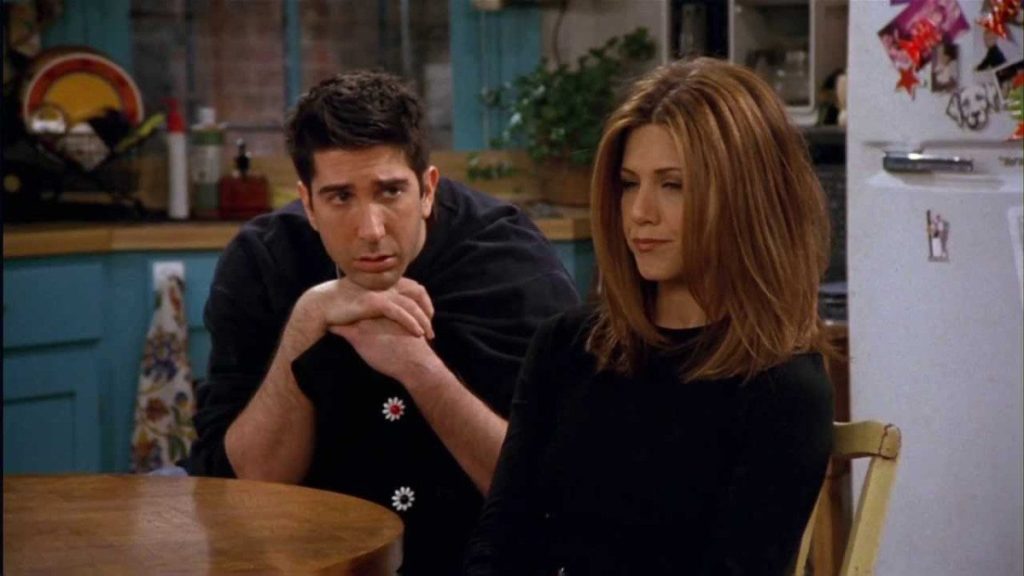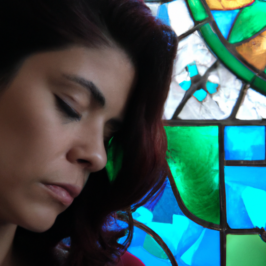
By: Brian Warner
She was a girl still in her wedding dress after leaving her fiancé at the altar. He was a boy newly divorced after his wife left him for another woman. What could go wrong?
Maybe it’s no coincidence that one of the most famous relationships of the ‘90s was also one defined by a breakup: Ross and Rachel. For anyone not up to date on NBC’s Must-See TV lineup from 25 years ago, Friends’ biggest will-they-or-won’t-they couple actually became a they-will in Season 2 – but by Season 3, they split after an argument led to Rachel suggesting that they “take a break” and, within just a few hours, Ross slept with another woman. And for the next seven and a half years, he would remind us over and over again, “WE WERE ON A BREAK!”
But, somehow, all these years later, everyone knows that they’re still each other’s lobster.
How does a love story where one partner’s catchphrase about how he didn’t *technically* cheat become one of the most famous couples in TV history? For many of us, infidelity is the final dealbreaker. There’s. No. Moving. On. And that’s a reasonable way to respond; it’s a special kind of hurt when it comes from someone who’s supposed to never do that to you, and as many as 40% of divorces happen because of it. But for others, there can still be a future, even if forgiveness is a long way off.
How do we move on from mistakes that can’t be taken back?
Marriage and family therapist Amanda D. Mahoney says that when couples manage to stay together after someone cheats, it usually happens because “there’s a willingness to process the potential symptoms that may have contributed to the affair versus focusing solely on the act of the affair itself.”
Mahoney describes this as getting real with your partner to understand whether cheating is 1) a sickness or 2) a symptom in your relationship. Bringing it back to Friends for a second, option one fits with Rachel’s taunt of “Once a cheater, always a cheater” when they briefly try getting back together. But Mahoney would have Ross and Rachel look at the things that preceded any cheating, like Rachel feeling resentful for Ross’ jealousy and lack of support for her new career, and Ross feeling unseen and unappreciated in this new phase of Rachel’s life, to see where relationship repairs can be made.
“People can make poor choices at times,” Mahoney says. “The question then becomes: does that poor choice and/or symptom(s) now have to dictate the future of a relationship? The answer largely depends on the motivating factors behind the affair.”
That does not mean blaming yourself for your partner’s cheating. It’s not a chance to play the blame game with anyone. It instead means that there’s an alternative to channeling your inner Carrie Underwood and carving your name into the side of his (or her) pretty little souped up four-wheel drive.
Easier said than done.
Terry Gaspard, MSW, LICSW, with the Gottman Institute, says that “both partners must first accept that they each have work to do to recover from the pain.”
She tasks the partner who was unfaithful with putting in work to restore trust and ensure transparency going forward. Gaspard suggests that they:
- Be honest, use full disclosure about the affair, and find a way to atone or express remorse.
- Deal with the traumatic feelings after the discovery and be willing to ask and answer questions.
- Must end the affair.
- Be willing to apologize for cheating in a sincere way and promise not to repeat it.
Most of all, Gaspard stresses the importance of providing the betrayed partner with empathy and patience when they may be feeling all kinds of things from embarrassment to rage to loss.
That doesn’t mean that the betrayed partner doesn’t also have work to do, though it may look different. Gaspard tasks them to:
- Express your feelings to your spouse, but be sure to avoid accusations. Try to use “I” messages such as, “I feel deeply hurt by your actions and I’m not sure I can ever trust you again.”
- Avoid rehashing all of the events around the affair. Marathon talk sessions about it may deepen the wounds.
- Find a way to forgive or at least accept their partner’s actions and work towards forgiveness.
More than anything, take some time. Before making a firm decision to continue or end the relationship, Gaspard suggests taking time to heal from the trauma this revelation caused and understand it with a fuller perspective.
But Ross and Rachel were especially bad at this part (in their defense, they’re both sitcom characters). So while Ross ran all over Lower Manhattan trying to get everyone from Joey and Chandler to Isaac to Jasmine to Gunther to agree to keep the truth from Rachel, Gaspard would have him go straight to Rachel with total transparency and a recommitment to their relationship. And while Rachel tried to politic Ross out of the friend group after she found out, Gaspard would have her be direct with Ross about her feelings and maybe even take time away to ruminate – though, preferably, after defining what this break should look like. Are they allowed to check in with each other, and if so, to what extent? Can they ever call, meet up, sext, etc.? Can they see other people? How long should the break last?
In some ways, this work can give couples the chance to “end” their relationship and leave it with the cheating – in the past. And afterward, both go forward with the understanding that they’re two new people in a new relationship.
“I oftentimes tell couples they are going to have to bury that first relationship and think about starting a brand new relationship with each other,” says family and marriage therapist Jen Elmquist, MA, LMFT. “And in that new relationship you’re going to put in the same intensity you did in the beginning of your relationship all over again; that same intensity of learning about each other and caring for each other and being intentional with each other.”
The sad thing is that for as much as Ross and Rachel loved and cared about each other while they were dating, they also had plenty of unhealthy habits to derail their relationship early on – just like plenty of us have experienced in our own love lives.
They could both be insecure, and use the other for an ego-boost, and almost always turned away from each other with their feelings and concerns about the relationship.
But in the end, when Rachel decides to get off the plane to Paris and instead go profess her love for Ross, he jokes, “Unless we’re on a break.” It turns out, next to the trust, support, and respect they’ve developed for each other since he slept with another woman, the thing that kept them apart for so long is just one piece of their story together.
DISCLAIMER
The information, including but not limited to, text, graphics, images and other material contained on this website are for informational purposes only. No material on this site is intended to be a substitute for professional medical advice, diagnosis, or treatment. Always seek the advice of your physician or other qualified healthcare provider with any questions you may have regarding a medical condition or treatment and before undertaking a new health care regimen, and never disregard professional medical advice or delay in seeking it because of something you have read on this website.






